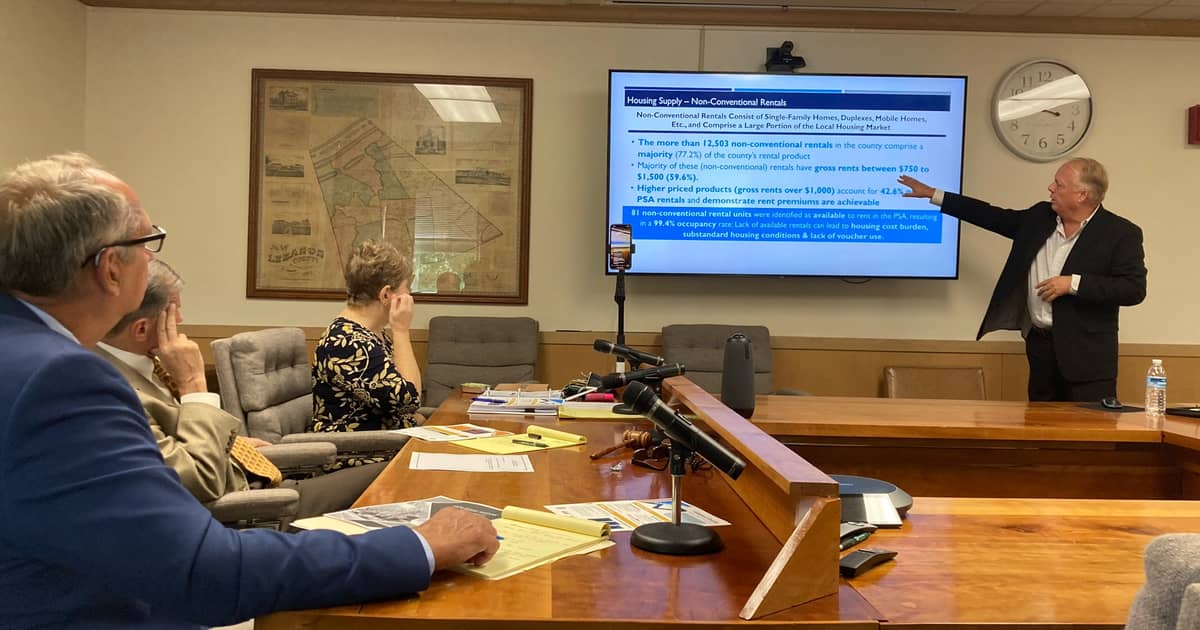A report that details Lebanon County’s available and affordable housing needs and potential solutions was presented Wednesday to the County Commissioners.
In highlighting the needs listed in the report (PDF), Patrick Bowen, president of Ohio-based Bowen National Research, also demonstrated how those two issues adversely impact the county’s economy.
Bowen showed numerous slides packed with statistical data noting that while the number of households in Lebanon County has increased over the past decade, the percentage of available homes to rent or buy has gone down.
Read More: New study highlights countywide housing problems, provides potential solutions
“Lebanon County, from 2010-2022, was growing very quickly, relative to the state,” said Bowen. “Projections for 2022 to 2027, 1 percent growth, you’re growing, Pennsylvania, that’s a big thing because there’s a lot of places around Pennsylvania that are not experiencing very much growth or are expected to not experience very much growth.”
Between 2010 and 2022, Lebanon County households increased by 4,164, or 8 percent. That number is expected to increase countywide by 580 households, or 1 percent by 2027. Bowen said that figure is five times the projected growth rate (.02 percent) for the rest of the state.
“Every part of the county is going to grow — some a little bit faster than others, but the point is that every (school) district or every part of the county will increase the number of households,” added Bowen.
By contrast, the percentage of available and affordable housing units for sale has shrunk to a paltry 0.3 percent.
“Of the 131 homes available countywide, (and) if I compare that to all of our owner housing stock, that number is three-tenths of a percent,” said Bowen. “What does that mean? Normally, in a healthy market, you want about 2 to 3 percent vacant. You have three-tenths of a percent.”
Bowen said these issues negatively impact the county’s economy.
“You are so far below where you should be to have a healthy market. Again, for economic development, economic growth, this is terrible news,” he added.
That’s not the only bad economic news, either.
Bowen noted that 24,245 employees commute into Lebanon County daily from other locations, which accounts for nearly half of the workforce across Lebanon County.
“So, 24,000 people coming in is a lot of folks that possibly would be residents of your county,” said Bowen. “This is really relevant because when we do surveys … and say, ‘Look. You’re coming into this county to work. Would you live here if housing was available and affordable to you?’ On average, we get about 40 percent of the people … say they would live in the county if housing were available and affordable.”
That, Bowen added, impacts the economic vitality of the county.
“These are people who are probably spending money for lunch, and they’re out of here,” said Bowen. “They’re not spending money that they earned in your county, they’re not spending it in your county. They’re going back home wherever they may live. So you have an opportunity to grab some of these folks.”
About half of those commuters, Bowen noted, are between the ages of 30 and 54 and earn over $40,000 annually.
“So, these are good-paying jobs, but those folks don’t stay in our area,” said Bowen. “But if they wanted to live here, they don’t have much to choose from.”
Bowen said 6,500 daily commuters to Lebanon County travel at least 50 miles to their work sites, which is not sustainable long-term.
“With gas prices the way they are, that’s a major challenge for workers,” said Bowen. “You run the risk as a community (of losing them). What this means for these workers is that they can not sustain this cost. For someone making less than $40,000 a year, that’s something they can’t maintain over a long period of time.”
Bowen said the occupancy rate for all rental units in Lebanon is around 99.6 percent. He added that the figure is one of the highest numbers he’s seen of the approximate 30 communities his company has studied over the past few years.
“What do you want for a healthy market?” asked Bowen. “You want that to be around 94 to 96 percent. So, you want vacancies. You want vacancies as people move, their lives change, they get married, they have kids, their jobs change or their wages climb. The ability to attract all of those commuters who are coming in. Where are they going to choose to move? This is not very good news for the community.”
Bowen emphasized several times that Lebanon County has housing availability and affordability issues across all housing segments.
“Everything is full or nearly full — it’s a countywide problem,” said Bowen. “Both in geography but also affordability level. It’s not like any market has escaped this problem. It’s not like any segment of the market has escaped.”
Bowen said over 5,000 individuals are waiting for government-subsidized housing units and at least another 1,600 are seeking tax-credit units.
“There’s a lot of pent-up demand for rental housing regardless of what type we’re talking about,” added Bowen. “So, high demand, waitlist. If there is a silver lining in this, it is that, for the development community, there is demand for them. If I am a developer, I am comfortable coming here knowing that there is demand.”
Bowen advised the commissioners to “get the word” out to developers and investors about these kinds of housing opportunities.
Rental affordability is an issue with many would-be tenants. One-bedroom, one-bath units run, on average, $1,290 a month, and two-bedroom, one-bath rental units cost $1,330 a month.
“The point is, there is a big chunk of people in your county who can not even afford the rent,” said Bowen. “So, even if you are lucky enough to … find one, most people can’t afford that kind of rent.”
Bowen provided a number of potential solutions on one of his slides (as shown in the photo below).

He advised the commissioners to set realistic/attainable short-term housing goals, outline long-term objectives and monitor progress. He also urged them to build capacity and to find “a housing champion” to carry the housing torch for Lebanon County.
“To me, that’s where this all starts — somebody has to be the person or the group who spearheads this. Whether this is a government-created task force, whether this is a stakeholder-driven housing commission, whether you hire someone … bring somebody in as a housing authority to lead this effort,” said Bowen.
Prior to the start of Bowen’s presentation, Nicole Maurer Gray, executive director for the Community Health Council of Lebanon County, said the study will be incorporated into the county’s comprehensive plan, which is slated to be updated in 2024.
Read More: Lebanon County launches process to craft new 10-year comprehensive plan
“We do hope that we find a lot of good information and have all the data we need, the county needs, to help move the comprehensive plan forward. I think this will be a great for that project and I am very excited,” said Gray.
Community members can see Bowen’s full housing needs presentation and ask questions about the report at a public meeting today at 1 p.m. at the Lebanon Valley Chamber of Commerce. Pre-registration is not required, but is encouraged.
Questions about this story? Suggestions for a future LebTown article? Reach our newsroom using this contact form and we’ll do our best to get back to you.

Become a LebTown member.
Cancel anytime.
Monthly Subscription
🌟 Annual Subscription
- Still no paywall!
- Fewer ads
- Exclusive events and emails
- All monthly benefits
- Most popular option
- Make a bigger impact
Already a member? Log in here to hide these messages
Free local news isn’t cheap. If you value the coverage LebTown provides, help us make it sustainable. You can unlock more reporting for the community by joining as a monthly or annual member, or supporting our work with a one-time contribution. Cancel anytime.

























